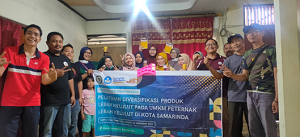Edukasi dan Pelatihan Pembuatan Turunan Hasil Olahan dari Produk Lebah Kelulut pada Kelompok Peternak Lebah di Samarinda Education and Training on Making Derivatives from Kelulut Bee Products for Beekeepers in Samarinda
Main Article Content
Abstract
Kelulut bee (Trigona sp.) products knowly as honey, pollen and propolis. Kelulut beekeepers in Samarinda are still oriented towards income from the sale of honey. The purpose of this activity is to improve the understanding and skills of kelulut beekeepers in making derivative products from honey as an alternative to selling value products. This community service is carried out by means of education and training in making products made from honey, propolis and pollen. The results of the evaluation of community service activities are measured by their level of understanding after being given training to have a good increase in the level of knowledge. The activity received a very good appreciation and participants hoped that the activity would be carried out regularly.
Downloads
Article Details

This work is licensed under a Creative Commons Attribution-ShareAlike 4.0 International License.
Authors who publish with this journal agree to the following terms:
- Any article on the copyright is retained by the author(s).
- Author grant the journal, right of first publication with the work simultaneously licensed under a Creative Commons Attribution License that allows others to share work with acknowledgment of the work authors and initial publications in this journal.
- Authors are able to enter into a separate, additional contractual arrangements for non-exclusive distribution of published articles of work (eg, post-institutional repository) or publish it in a book, with acknowledgment of its initial publication in this journal.
- Authors are permitted and encouraged to post their work online (e.g., in institutional repositories or on their websites) prior to and during the submission process, as can lead to productive exchanges, as well as earlier and greater citation of published work.
- The article and any associated published material is distributed under the Creative Commons Attribution-ShareAlike 4.0 International License
References
Komala, L., Budiyanto, A., Wibowo, W. A., Praditya, A., Pamungkas, I. B. (2020). Membangun Kreativitas dan Kemandirian Masyarakat di Masa Pandemi Covid-19. Dedikasi PKM, 1(2), 20-24. http://dx.doi.org/10.32493/dedikasipkm.v1i2.6384
Lukman, Hardiansyah, G., & Siahaan, S. (2020). Potensi Jenis Lebah Madu Kelulut (Trigona spp) untuk Meningkatkan Ekonomi Masyarakat Desa Galang Kecamatan Sungai Pinyuh Kabupaten Mempawah. Jurnal Hutan Lestari, 8(4), 792-801. http://dx.doi.org/10.26418/jhl.v8i4.44327
Mubarak, A. (2010). Psikologi Remaja Perkembangan Peserta Didik. Jakarta: Bumi Aksara.
Pribadi, A. (2020). Produktivitas Panen Propolis Mentah Lebah Trigona itama Cockerell (Hymenoptera: Apidae) Menggunakan Propolis Trap dan Manipulasi Lingkungan di Riau. Majalah Ilmiah Biologi Biosfera : A Scientific Journal, 37(2), 60-68. https://doi.org/10.20884/1.mib.2020.37.2.1045
Suratno, S. & Nurhalina, N. (2019). Edukasi Resiko Penularan Penyakit Melalui Sampah pada Pemulung Sampah di Tempat Penampungan Sementara Kelurahan Bukit Tunggal Kota Palangka Raya. PengabdianMu: Jurnal Ilmiah Pengabdian Kepada Masyarakat, 4(2), 141–148. https://doi.org/10.33084/pengabdianmu.v4i2.964
Syafrizal, Bratawinata, A. A., Sila, M., Marji, D. (2012). Jenis Lebah Kelulut (Trigona spp.) di Hutan Pendidikan Lempake. Jurnal Ilmiah Mulawarman Scientifie, 11(1), 11-18.
Wardaniati, I. & Pratiwi, D. (2017). Uji Aktivitas Antibakteri Ekstrak Etanol Propolis Lebah Trigona (Trigona Spp) terhadap Propionibacterium acnes Penyebab Jerawat. JOPS (Journal of Pharmacy and Science), 2(1), 14-21. https://doi.org/10.36341/jops.v2i1.1257
Wulandari, D. D. & Hasanah, U. (2017). Analisa Kualitas Madu (Keasaman, Kadar Air, dan Kadar Gula Pereduksi) Berdasarkan Perbedaan Suhu Penyimpanan. Jurnal Kimia Riset, 2(1), 16–22. https://doi.org/10.20473/jkr.v2i1.3768
Yanuartati, B. Y. E. (2021). Pembinaan dan Pendampingan Teknik Budidaya Trigona sp Bagi Peternak Kecil di Kabupaten Lombok Barat. Jurnal Pengabdian Magister Pendidikan IPA, 4(4), 489–492. https://doi.org/10.29303/jpmpi.v4i4.1131
Yumantoko, Al Hasan, R., & Riendriasari, S. D. (2022). Analisis Kelayakan Usaha Budidaya Lebah Kelulut di Lombok, Nusa Tenggara Barat. Jurnal Litbang: Media Informasi Penelitian, Pengembangan dan IPTEK, 18(1), 17-30. https://doi.org/10.33658/jl.v18i1.264
